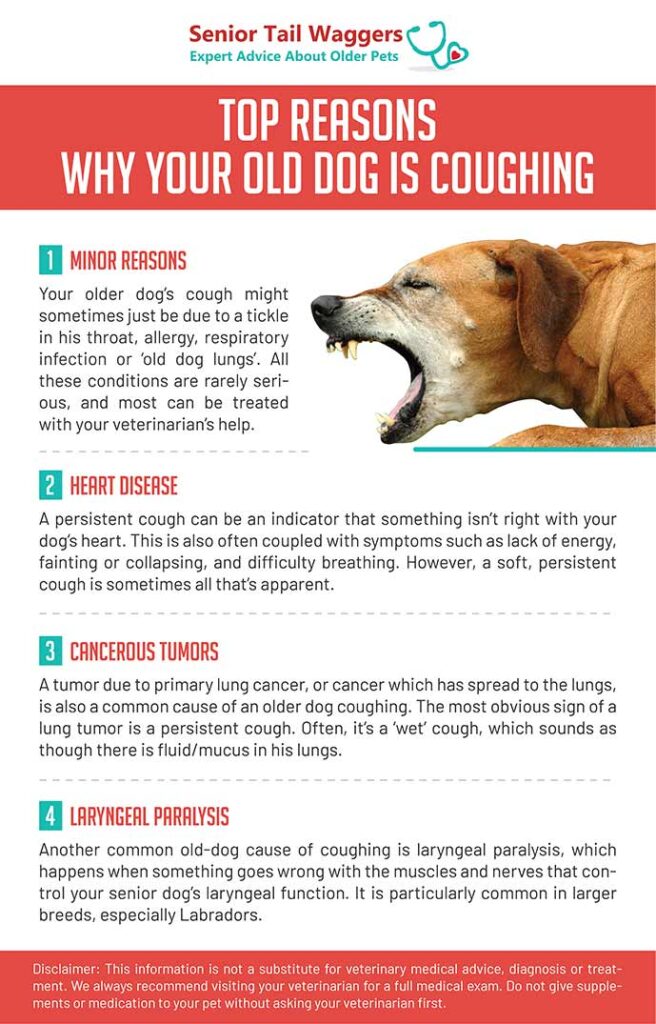
This article was updated on September 1st, 2022
Your situation:
✓ your dog is a senior dog
✓ your dog has a dry cough
✓ your dog is showing other signs of illness
(If this is NOT your situation, click here.)
A dry cough in a senior dog that is NOT feeling well may represent a minor ailment but could also be serious. Coughing is often a symptom of some type of dysfunction of the dog’s respiratory tract. When your dog is also NOT feeling well (for example, acting lethargic or not eating well), it is a strong indicator that something is amiss. Let’s look at the most likely causes and what needs to be done.
Most Likely Causes for a Dry Cough in a Senior Dog Not Feeling Well
Just as with humans, older dogs often combat different diseases and conditions than their more youthful counterparts. In the instance of a senior dog with a dry cough and not feeling well, I would be more concerned about heart and lung issues.
Early intervention is key in these instances, so if your senior dog begins coughing, they need to be seen by their veterinarian as soon as possible.
Evaluating the type of cough, as well as the dog’s overall health, can give us a clue as to what is the most likely cause. The most common causes of a dry cough in a dog that is also exhibiting signs of illness are the following:
1. Heart Disease
In dogs, the most common type of heart disease we see is dilated cardiomyopathy. This heart condition results in a “stretched out”, flabby heart that loses the ability to properly contract. This leads to sluggish blood flow and fluid build-up in the lungs and abdomen.
Dogs with heart disease often cough first thing in the morning or after getting up from lying down. This is due to the fluid pooling in the lungs. It can be difficult to ascertain if the cough is “dry” or “wet” from simply hearing the dog cough. Poor oxygenation and difficulty breathing may lead to the dog not feeling well. At this point, the dog is in congestive heart failure and it is an emergency.
There are treatments available to help ease congestive heart failure, however, it cannot be cured. Depending on the severity of the condition when diagnosed, costs may range from a few hundred dollars to thousands.
2. Pneumonia
Another common cause for a dog that is coughing and doesn’t feel well is pneumonia. Caused by bacteria, viruses, or fungal organisms, pneumonia can cause dogs to be systemically ill. Though many cases of pneumonia cause more of a “wet” cough, it can be difficult to determine by just listening to the dog cough.
A dog coughing and not feeling well needs to see their veterinarian right away. Dogs with pneumonia are sick and if left untreated, the condition may become fatal.
Pneumonia is treated with hospitalization, medications to treat the infection, medications to lower fever and ease pain, and intravenous fluids to correct dehydration. The cost for medical care for a dog with pneumonia is highly variable and depends on the cause, the severity, and the length of hospital stay.
3. Upper Respiratory Infections
Infectious respiratory diseases, including viruses and bacterial causes such as “kennel cough”, are extremely common. However, if the dog is also not feeling well, it is possible they have a more severe case or that they have developed a secondary issue.
Dogs may pick up the bacteria or viruses that cause these upper respiratory infections anywhere where they come into contact with other dogs. Common places are boarding and grooming facilities, vet’s offices, doggy day care, and dog parks.
If your dog isn’t feeling well, it is likely they have a fever or a more serious infection, such as canine influenza. A prompt visit to the veterinarian is a must. These infections may be treated with antibiotics, if bacterial, or medications may be given just to ease clinical signs.
Dogs may require anti-inflammatories, cough suppressants, expectorants, and often hospitalization.
The cost to treat a more serious upper respiratory infection varies widely depending on diagnostics and treatments needed. Typically, this trip to the vet will run anywhere from $100 to $500. If the dog requires hospitalization and IV fluids due to dehydration, the cost will be higher.
4. Other causes
Many conditions can cause dry coughing in dogs. To learn more, read our article about Senior Dog Coughing. Make sure to also meet with your veterinarian to get a full medical exam for your dog: If left untreated, many conditions will worsen and may even become life-threatening.
Let’s now review several ways to give your coughing dog some relief at home.
How To Help a Senior Coughing Dog at Home
If your old dog is coughing and showing other signs of illness, they need to be seen by your veterinarian. If left untreated, many conditions will worsen and may become life-threatening. The sooner your dog is seen and treated by a veterinarian, the sooner they will be feeling better.
While you coordinate with your veterinarian to help evaluate your dog, there may be things you can do at home to help provide relief to your dog. Let’s have a look with the help of our veterinarian expert Dr. Debra Eldredge.
8 Best Home Remedies To Help Your Coughing Dog
Our veterinarian Dr. Debra Eldredge – author of the best-selling book “Dog Owner’s Home Veterinary Handbook” – has compiled for us a list of the most effective home remedies to help coughing dogs:
1. Start with Simple Home Care: If your dog has discharge from his eyes or his nose, use a warm compress to soften the crusts and clean gently. A dab of vitamin E (puncture a capsule with a pin and squeeze out a drop) can help with a sore nose. Artificial tears drops or ointment can be safely applied to his eyes.
2. Use a Humidifier or Steam: Excessively dry air can cause coughing in dogs. If you have a humidifier, encourage your dog to rest in that area.
3. Use a Teaspoon of Honey: People also often reach for honey when they have a cough. A teaspoon of honey in a cup of warm water may ease a short throat. This is not recommended for puppies (think about infant cautions) or for dogs with diabetes as it can interfere with glucose regulation.
4. Consider Limiting Physical Activity in Cold Weather: Very cold, dry air outside can stimulate coughing as well as dry air inside. Senior dogs don’t handle extreme cold well. Keep walks short and limited.
5. Use a Non-Restrictive Harness Instead of a Collar: Be sure that you use a non-restrictive harness for walks. Do not walk your dog on a collar. The pressure on the trachea can stimulate more coughing.
6. Give your Dog a Quiet Place to Rest: Coughing can be exhausting. Make sure your dog has a quiet place to rest, away from active children or other pets.
7. Increase Hydration: It is important to support your dog’s hydration when he has a cough: coughing can increase his normal hydration needs. If your dog is not drinking enough water, consider trying homemade chicken soup, low or no sodium bouillon, or adding some juice from tuna canned in water or other meat juice flavoring (plain) to his water.
8. Over the Counter Cough Medication: Dextromethorphan is a common ingredient in human OTC cough medications such as Robitussin. It can be helpful for some dogs short term. This is an “off label” medication so you should check with your veterinarian about use in your individual dog. It is not recommended for dogs with liver problems or for dogs on a number of medications.
Reading the entire article: 8 Best Home Remedies to Help a Coughing Dog (Vet Advice).
Important note: The home remedies mentioned here are only supportive ideas to help your dog with symptoms – they are not likely helping with the root cause. A visit to your veterinarian is important to help understand the root cause and define an effective treatment plan – in particular if your dog is not feeling well. Putting off a veterinary visit could endanger your dog if he has a serious underlying cause for the cough (For example, respiratory distress can come on quickly and be hard to recognize. Your dog may need oxygen therapy).
You should not administer any over-the-counter medications to your pet, either human or veterinary, without permission from your veterinarian. These medications may be toxic, contraindicated in your specific dog’s situation, or even make the condition worse.
When Is Coughing Serious Enough to See Your Vet?
You might be wondering if your dog’s cough or gagging is serious enough to justify a visit to your veterinarian. It can be hard to know as an owner when a cough is serious enough to warrant veterinary attention.
A dog may occasionally cough to clear their throat or if something irritates them. That’s usually not a cause for concern. However veterinary attention is likely required if a cough:
- becomes persistent,
- lasts more than 2 days, or
- becomes more frequent or severe
Additionally, a cough is always serious if it comes with breathing difficulties, if your dog is showing other signs of illness, or if they are coughing up large amounts of phlegm or blood.
As a general rule, it may be ok to just monitor your dog’s cough at home, if your dog is still:
- bright in themselves and
- eating and drinking as normal
Since coughing can be a symptom of a serious ailment, it’s important to be cautious and take your dog to the veterinarian if you are unsure about what to do.
What Will the Vet Ask You
It’s important to be prepared for the basic questions your vet will want to ask about your old dog’s coughing or gagging. Being able to answer your vet’s questions will help improve diagnosis and ultimately solve the issue faster for your canine friend. Questions may include:
- How can you describe the cough? (choking, gagging, retching, gasping or throat clearing noise, etc?) – it may not even be a cough at all!
- How frequent is the cough? Is coughing on a daily basis, several times per day?
- How long has coughing been going on?
- Are there any other symptoms associated with the cough such as breathing issues?
- Is the cough productive – i.e. does your dog bring anything up when they cough?
- Does the cough appear to come more from the throat or chest?
- Does anything trigger the cough? Or does it happen in a specific environment?
How Will Your Vet Diagnose the Issue?
Your vet will start by taking a thorough history (see how to prepare for the visit below) and by performing a physical examination on your dog. They will pay particular attention to any abnormal heart or breathing sounds, the heart rate and rhythm and your dogs temperature. By using all of this information, they will then decide the best next course of action.
Sometimes your vet may opt to start a trial treatment plan and base the diagnosis on the response to medication. For example, in the case of kennel cough, anti-inflammatory medication is often all that is required and if your dog responds well then it’s likely that kennel cough was the cause.
However, if a heart murmur or abnormal heart rhythm is detected then a heart ultrasound scan and X-rays might be the next step. This will help evaluate whether or not your dog’s heart has signs of congestive heart failure such as thickening of the heart walls, inefficient heart valves or fluid build up within the lungs.
X-rays are a key tool in evaluating any dog that has developed a persistent cough. By taking an X-ray of your dogs chest and lungs, vets will be able to visualise the distribution of air within the lungs. A healthy dogs lungs should appear dark on an X-ray as they are full of air; the presence of any lighter coloured areas may indicate thickening within the lungs or even fluid build up. There are many different ‘lung patterns’ that can be identified on an X-ray that can point towards a specific diagnosis.
In some cases your vet may want to perform a ‘broncho-alveolar lavage’, this involves inserting a small volume of sterile fluid into your dog’s lungs and then aspirating it back out. The idea is that by sucking that fluid back out the vet will also gain a sample of the types of cells or even bacteria present in the lungs, further helping reach a diagnosis.
Infographic: Top reasons why your old dog is coughing
The infographic below summarizes the top 4 reasons causing older dogs to cough repeatedly:

Learn more about coughing in senior dogs:
Disclaimer: This website's content is not a substitute for veterinary care. Always consult with your veterinarian for healthcare decisions. Read More.



Be the first to comment